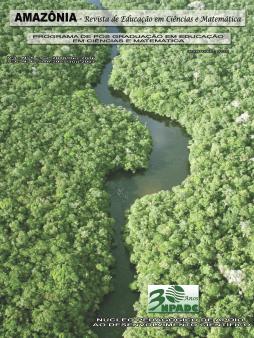EDUCIMAT program: essays and reflections about universitary extension
DOI:
https://doi.org/10.18542/amazrecm.v3i0.1731Keywords:
EDUCIMAT, education in science and mathematics, university extensionAbstract
This article is an initial study on the actions of continuing teacher's education developed by the Center for Development Support Teaching Scientific of Federal University of Path, looking from the perspective of undergraduate and postgraduate Fellows from the projects of university extension and its role in policies for basic education. The work takes as its object of study EDUCIMAT Program: Education, Technology and Services in Science and Mathematics Education, developed by this Center in partnership with the University of Amazonia, Path University Center and Path State University, with the funding of Ministry of Education. This program aims to improve education in science and mathematics at the Path state region through the continuous education of teachers of kindergarten and elementary school. The working strategy foresees the formation / strengthening teachers' groups tutors Pedagogical Centres of Scientific Development Support in the municipalities, through the establishment of Support Groups Pedagogical Scientific Development at (level) specialization. The development program involves the completion of internal seminars, extension courses in the capital and countryside, specialization courses, annual workshops, intellectual and publishing development of modules and annual meetings of Education in Science and Mathematics, bearing, transverse mode, including education, environmental education and indigenous education. The program is offered for four years, beginning in Path State, with potential to expand to other states, especially in the North, Northeast and Midwest. We recognize the importance of investigating, appreciating and discussing teaching practices in light of theoretical discussions as one of the reasons that can result significant changes in student-teacher relation-content, whereas expression committed to the relationship between education, research and extension, principle latent within institutions of higher education who seek the social quality educationReferences
ARAGÃO, Rosália Maria Ribeiro et al. A Dimensão da Extensão nas Relações com o Ensino e a Pesquisa. In: Tratando a Indissociabilidade Ensino Pesquisa Extensão. São Bernardo do Campo: UMESP, 2002.p. 41- 53.
BRITO,Antonia Edna. O significado da reflexão na prática docente e na produção dos saberes profissionais do/a professor/a. Revista Iberoamericana de Educación (Online), v. 37/8, p. 01-06, 2006.
GONÇALVES, Terezinha Valim Oliver. Relatório Geral 2005. Belém, 2006. p.3, 36.- NPADC, Universidade Federal do Pará.
HALL, Stuart. A identidade cultural na pós-modernidade. 9ª ed. Rio de Janeiro: DP& A, 2004.p.102.
HENNINGTON, Elida azevedo. Acolhimento como prática interdisciplinar num programa de extensão universitária. Caderno de Saúde Pública, Rio de Janeiro, 21(1):156-265, jan-fev, 2005. INFORMAÇÕES sobre o Núcleo de Apoio ao Desenvolvimento Científico. Disponível em: http://www.ufpa.br/npadc. Acesso: Out/2007.
MESQUITA, Filho Alberto. Integração ensino-pesquisa-extensão. Ensino, Pesquisa, Extensão. 1997; III: 138-43.
ROCHA, Dorotéia Rocha da Silva; PARENTE, Andrela Garibaldi. Parecer técnico do Programa EDUCIMAT elaborado em maio de 2007 (mimeo0). SESU / MEC. Fórum de Pró-Reitores de Extensão das Universidades Públicas Brasileiras. Plano Nacional de Extensão Universitária. Edição Atualizada. Brasil 2000 / 2001.
SILVA, Oberdan Dias da. O que é extensão universitária? Disponível em: http://www.ecientificocultural. com/ECC2/ artigos.Acesso: Out/2007.
TEIXEIRA , Olívio Alberto. Interdisciplinaridade: problemas e desafios. Revista Brasileira de Pós Graduação, Brasília, v. 1,n. 1, p. 57-69, 2004.



